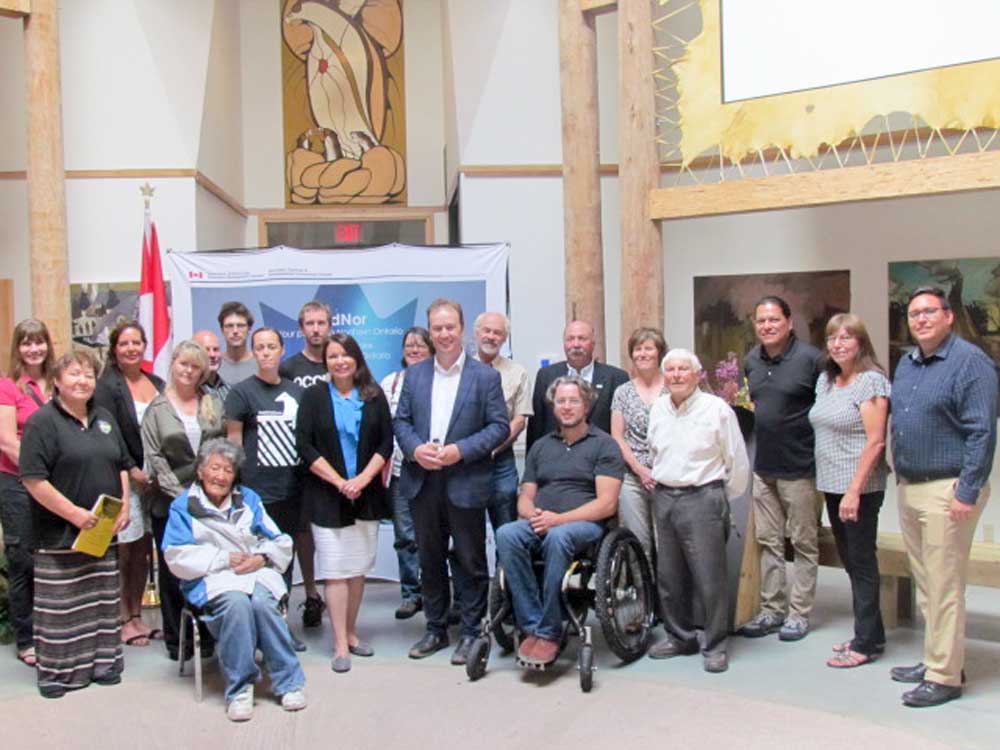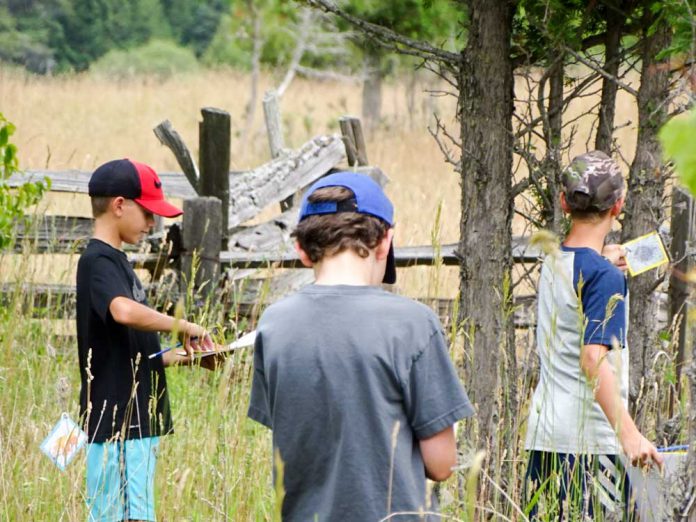M’CHIGEENG—Paul Lefebvre, Sudbury Member of Parliament (MP) announced nearly $5 million in investment for 17 Manitoulin projects through the Federal Economic Development Initiative for Northern Ontario (FedNor) on July 23 during an event at the Ojibwe Cultural Foundation (OCF).
Mr. Lefebvre made the statement on behalf of the Honourable Navdeep Bains, Minister of Innovation, Science and Economic Development, and responsible for FedNor, at the Ojibwe Cultural Foundation (OCF) in M’Chigeeng.
Mr. Lefebvre expressed his pride in being part of a Liberal party that recognizes the unique needs of Northern Ontario and said that his government is investing to strengthen communities and accelerate growth throughout the Manitoulin region. “The funding announced today,” he said, “will create jobs, support tourism, infrastructure, business growth and broadband while fostering innovation and skills training within the region’s Indigenous labour force.”
The investments made today stretched from one end of the Island to the other. Northeast Town Mayor Alan MacNevin attended the FedNor announcement as his municipality received $1,060,000 to accelerate business development and economic growth by extending wastewater services to accommodate commercial development in Little Current. Funds will also be used to construct a new access point to the highly popular Cup and Saucer Trail.
Other funds awarded in Little Current will enable Kelly and Craig Timmermans, owners of Manitoulin Radio Communication, to see the installation of a new broadcasting tower to the tune of $163,285. This will help create and maintain 17 local jobs and will support the ongoing success of Country Fest. An investment of $60,000 will go towards this very popular festival to complete capital improvement to the venue. Country Fest attracts 20,000 tourists a year to the region.
Also situated in the Northeast Town, the non-profit Northern Ontario Permaculture Research Institute (NOPRI) has received $31,500 to hire a youth intern for a one-year period. This intern will help implement the final design and construction of an innovative greenhouse that uses renewable energy, recycled materials and mobile communication technologies. The goal of the project is to demonstrate the viability of producing food year-round in Northern climates using a full-scale 1,000-foot version of the company’s prototype greenhouse.
Anong Beam, the executive director of the OCF, was pleased to accept a FedNor investment of $188,395, saying “It is for two years and it is very good for other organizations also because it shows that we are supported federally.” The OCF funds will be used to establish an Indigenous arts and crafts entrepreneurship incubator pilot program. This will lead to job creation and will provide a new social enterprise revenue stream. Entitled Enaamijge Yaang Studios (Our Vision), the program will feature workshops with access to quality materials and a fully-equipped studio.
The Weengushk Film Institute will also receive FedNor funds. This $31,500 will be used to hire a youth intern for a one-year period. This will allow Weengushk to expand its operations to become a world-class media education and training facility. The intern will explore new programming opportunities such as Indigenous arts media training, Indigenous media pitch competitions, new production skills workshops and industry mentoring, and determine the viability of establishing satellite campuses throughout Northern Ontario.
M’Chigeeng First Nation Chief Linda Debassige was thankful for the funding through FedNor’s Northern Development Program which means so much to her community. “This investment,” she said, “highlights the important role the Government of Canada plays to advance the social and economic well-being of First Nation communities and municipalities on Manitoulin Island and beyond. By supporting key sectors of our economy such as tourism, manufacturing, innovation, and telecommunications, FedNor is helping to ensure people, businesses, and communities have access to the resources they need to succeed.”
Manitoulin’s college, Kenjgewin Teg Educational Institute (KTEI), will also receive FedNor funding to the tune of $611,556. These monies will be used to purchase and install state-of-the-art equipment and furnishings at the Institute’s new Anishinawbek Skills, Innovation and Research Centre for skilled trades programs.
Enaadmaagehjik, the Wikwemikong Development Commission, will receive funding of $1,338,782 to support the growth of the community’s first light industrial park, leading to the maximization of economic opportunities and to the creation of middle-class jobs. The band will also hire an intern for a two-year period to work as an information and communication technology business support officer.
The Manitoulin Tourism Association will receive $33,525 in funding to support the development and implementation of a sustainable tourism management action plan. This will help form strategic alliances between industry stakeholders and will identify destination management best practices and promotional strategies to enhance tourism and economic growth throughout the area.
The Split Rail Brewing Company, situated in Gore Bay, continues to expand, and a repayable FedNor investment of $66,600 will lead to increased productivity through improved water and energy efficiency, reduced packaging costs, and enhanced quality control. The initiative will allow the owners to purchase and install new equipment and adopt new technology that will open fresh distribution and retail markets and include gaining access to The Beer Store and the LCBO.
The Township of Billings also received FedNor monies of $818,276 to boost tourism and spur economic growth. This will enable the municipality to implement phase one of its waterfront revitalization project, which will see major improvements to the local docks and will create an additional 12 slips. As well, a diesel fueling facility and septic system will be installed. Power pedestals will be installed to provide lighting, power, and water to the existing docks at the Austin Hunt Marina and larger docks will be installed at the Small Craft Basin.
The Government of Canada is also investing $100,000 in the Dawson Citizens Improvement Association (DCIA) to modernize the Meldrum Bay marina and campground to help entice boater and recreational vehicle enthusiasts from southern Ontario and the United States to visit the area. Specifically, the investment will support the installation of a new, above ground, double-walled, dual-chamber, 2,000-litre tank for gasoline and diesel fuel, as well as a new 2,000-gallon-capacity sewage holding tank and pump out system to accommodate boats and RVs. A second access point from the marina to Highway 540 will also be established.
Sheguiandah First Nation will also receive FedNor funds. The amount of $15,907 will be used to help complete a feasibility study to support business development on its recently purchased agricultural property. The study will help maximize the economic potential of the 131 acres of farmland by identifying community-owned businesses that could utilize the land to create new employment and generate positive economic benefits for the community.
The Waubetek Business Development Corporation, situated on Birch Island, also received a Government of Canada investment for $234,000. This will allow the coordination and undertaking of regional economic and business development projects for a three-year period. Specifically, this targeted investment will support Indigenous youth leadership, Indigenous women’s entrepreneurship programs, as well as the implementation of the Aboriginal Fisheries Strategy. The project will also support the implementation of an aquaculture business development and regional mining strategy, as well as the proposed Centre of Excellence for Indigenous Mineral Development.
To form partnerships and increase engagement between Indigenous people and the mining sector, FedNor is also investing $200,700 to allow Waubetek to coordinate and implement its Aboriginal Mining Strategy for Northeastern Ontario over a three-year period. The strategy will focus on four priority areas including developing aboriginal knowledge and capacity, developing industry and First Nations relations, aboriginal workforce development, and establishing business partnerships.





